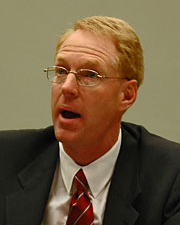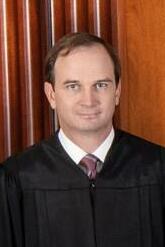Related Research Articles

The Fourteenth Amendment to the United States Constitution was adopted on July 9, 1868, as one of the Reconstruction Amendments. Usually considered one of the most consequential amendments, it addresses citizenship rights and equal protection under the law and was proposed in response to issues related to formerly enslaved Americans following the American Civil War. The amendment was bitterly contested, particularly by the states of the defeated Confederacy, which were forced to ratify it in order to regain representation in Congress. The amendment, particularly its first section, is one of the most litigated parts of the Constitution, forming the basis for landmark Supreme Court decisions such as Brown v. Board of Education (1954) regarding racial segregation, Roe v. Wade (1973) regarding abortion, Bush v. Gore (2000) regarding the 2000 presidential election, Obergefell v. Hodges (2015) regarding same-sex marriage, and Students for Fair Admissions v. Harvard (2023) regarding race-based college admissions. The amendment limits the actions of all state and local officials, and also those acting on behalf of such officials.

The Defense of Marriage Act (DOMA) was a United States federal law passed by the 104th United States Congress and signed into law by President Bill Clinton on September 21, 1996. It banned federal recognition of same-sex marriage by limiting the definition of marriage to the union of one man and one woman, and it further allowed states to refuse to recognize same-sex marriages granted under the laws of other states.

Stephen Gerald Breyer is an American lawyer and jurist who served as an associate justice of the U.S. Supreme Court from 1994 until his retirement in 2022. He was nominated by President Bill Clinton, and replaced retiring justice Harry Blackmun. Breyer was generally associated with the liberal wing of the Court. He is now the Byrne Professor of Administrative Law and Process at Harvard Law School.

The Supreme Court of Missouri is the highest court in the state of Missouri. It was established in 1820 and is located at 207 West High Street in Jefferson City, Missouri. Missouri voters have approved changes in the state's constitution to give the Supreme Court exclusive jurisdiction – the sole legal power to hear – over five types of cases on appeal. Pursuant to Article V, Section 3 of the Missouri Constitution, these cases involve:
Charles J. "Chuck" Cooper is an appellate attorney and litigator in Washington, D.C., where he is a founding member and chairman of the law firm Cooper & Kirk, PLLC. He was named by The National Law Journal as one of the 10 best civil litigators in Washington. The New York Times described him as "one of Washington’s best-known lawyers." He has represented prominent American political figures, including Attorney General Jeff Sessions, in response to the alleged Russian interference in the 2016 United States elections; Attorney General John Ashcroft; and former National Security Adviser and United States Ambassador to the United Nations John Bolton.
Chevron U.S.A., Inc. v. Natural Resources Defense Council, Inc., 467 U.S. 837 (1984), was a landmark decision of the United States Supreme Court that set forth the legal test for when U.S. federal courts must defer to a government agency's interpretation of a law or statute. The decision articulated a doctrine known as "Chevron deference". Chevron deference consists of a two-part test that is deferential to government agencies: first, whether Congress has spoken directly to the precise issue at question, and second, "whether the agency's answer is based on a permissible construction of the statute."

Bump stocks or bump fire stocks are gun stocks that can be used to assist in bump firing, the act of using the recoil of a semi-automatic firearm to fire ammunition cartridges in rapid succession.

Paul George Cassell is a former United States district judge of the United States District Court for the District of Utah, who is currently the Ronald N. Boyce Presidential Professor of Criminal Law and University Distinguished Professor of Law at the S.J. Quinney College of Law at the University of Utah. He is best known as an expert in, and proponent of, victims' rights.

Ketanji Onyika Brown Jackson is an American lawyer and jurist who is an associate justice of the Supreme Court of the United States. Jackson was nominated to the Supreme Court by President Joe Biden on February 25, 2022, and confirmed by the U.S. Senate and sworn into office that same year. She is the first black woman and the first former federal public defender to serve on the Supreme Court. From 2021 to 2022, Jackson was a United States circuit judge of the United States Court of Appeals for the District of Columbia Circuit.

Patrick James Morrisey is an American politician and attorney serving as the 34th Attorney General of West Virginia since 2013. He is a member of the Republican Party.

Deepak Gupta is an American attorney known for representing consumers, workers, and a broad range of clients in U.S. Supreme Court and appellate cases and constitutional, class action, and complex litigation. Gupta is the founding principal of the law firm Gupta Wessler LLP and a lecturer at Harvard Law School, where he is an instructor in the Harvard Supreme Court Litigation Clinic.

Julius Ness "Jay" Richardson is an American judge and lawyer who serves as a United States circuit judge of the United States Court of Appeals for the Fourth Circuit. He was formerly an Assistant United States Attorney for the District of South Carolina.

The 2024 United States presidential election in Colorado is scheduled to take place on Tuesday, November 5, 2024, as part of the 2024 United States elections in which all 50 states plus the District of Columbia will participate. Colorado voters will choose electors to represent them in the Electoral College via a popular vote. The state of Colorado has 10 electoral votes in the Electoral College, following reapportionment due to the 2020 United States census in which the state gained a seat.
President Joe Biden began his presidency with fewer vacancies to fill than his predecessor. He pledged to nominate people with diverse backgrounds and professional experience; further he pledged to nominate the first black woman to the Supreme Court of the United States.
303 Creative LLC v. Elenis, 600 U.S. 570 (2023), is a United States Supreme Court decision that dealt with the intersection of anti-discrimination law in public accommodations with the Free Speech Clause of the First Amendment to the United States Constitution. In a 6–3 decision, the Court found for a website designer, ruling that the state of Colorado cannot compel the designer to create work that violates her values. The case follows from Masterpiece Cakeshop v. Colorado Civil Rights Commission, 584 U.S. ___ (2018), which had dealt with similar conflict between free speech rights and Colorado's anti-discrimination laws, but was decided on narrower grounds.

Julie Rikelman is a Ukrainian-born American lawyer who is serving as a United States circuit judge of the United States Court of Appeals for the First Circuit. She represented the Mississippi abortion clinic in Dobbs v. Jackson Women's Health Organization, the U.S. Supreme Court case that overturned the constitutional right to abortion.
Biden v. Nebraska, 600 U.S. 477 (2023), was a United States Supreme Court case related to the forgiveness of federal student loans by the Biden administration in 2022, challenged by multiple states. The Supreme Court's ruling was issued on June 30, 2023, ruling 6–3 that the Secretary of Education did not have the power to waive student loans under the HEROES Act.
Loper Bright Enterprises v. Raimondo and its companion case Relentless, Inc. v. Department of Commerce are pending United States Supreme Court cases regarding Chevron U.S.A., Inc. v. Natural Resources Defense Council, Inc.. The Court will decide whether or not to overrule Chevron.
Murthy v. Missouri is a case pending in the Supreme Court of the United States involving the First Amendment, the federal government, and social media. The states of Missouri and Louisiana, led by Missouri's then Attorney General Eric Schmitt, filed suit against the U.S. government in the Western District of Louisiana. They claimed that the federal government pressured social media companies to censor conservative views and criticism of the Biden administration in violation of the right to freedom of expression. The government said it had only made requests, not demands, that social media operators remove misinformation.
Moyle v. United States is a pending United States Supreme Court case about whether an Idaho abortion law conflicts with the federal Emergency Medical Treatment and Labor Act (EMTALA).
References
- 1 2 3 4 5 Wheeler, Lydia (January 26, 2024). "Big Donors Back New Group to Fight 'Deep State' at Supreme Court". news.bloomberglaw.com. Retrieved 5 March 2024.
- ↑ Liptak, Adam (15 January 2024). "A Fight Over a Fishing Regulation Could Help Tear Down the Administrative State". The New York Times. Retrieved 5 March 2024.
- ↑ VanSickle, Abbie (28 February 2024). "In Fight Over Bump Stock Ban, Lawyers Take Aim at Administrative State". The New York Times. Retrieved 5 March 2024.
- ↑ Raymond, Nate (August 2, 2023). "Priest asks US Supreme Court to bar SEC penalty on free speech grounds". Reuters .
- ↑ "Gregory Lemelson, aka Father Emmanuel Lemelson, et al., Petitioners v. Securities and Exchange Commission". Supreme Court of the United States. December 11, 2023. Retrieved 14 March 2024.
- ↑ Thomas, David (September 7, 2023). "Lawyers say exam shows 96-year-old US appeals judge still fit to serve". Reuters .
- ↑ Douglas-Gabriel, Danielle (7 August 2023). "Biden's student loan forgiveness plan faces new lawsuit to block program". Washington Post. Retrieved 5 March 2024.
- ↑ Lonas, Lexi (4 August 2023). "Lawsuit filed to stop new student debt relief plan". The Hill. Retrieved 5 March 2024.
- ↑ Myers, Steven Lee (9 September 2023). "Appeals Court Rules White House Overstepped 1st Amendment on Social Media". The New York Times. Retrieved 5 March 2024.